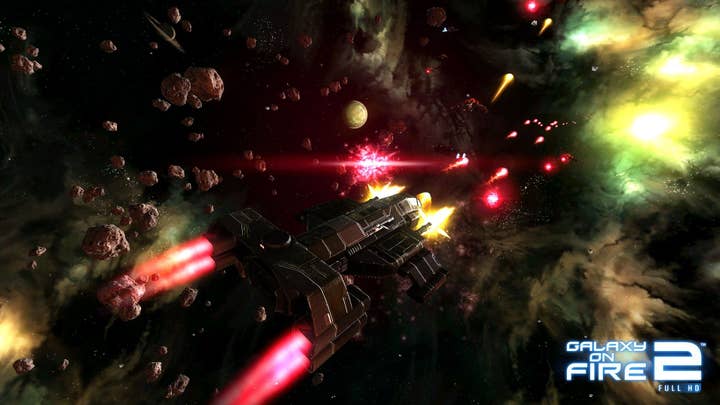Fishlabs' Michael Schade: "Eventually, you have to go free"
A triple-A mobile pioneer on why free-to-play won him over
Once the very epitome of the AAA, high price-point mobile ethos, Michael Schade's Fishlabs has recently taken the plunge with the free-to-play approach which so dominates the mobile market. With new games on the way which are planned to take advantage of the new business from day-one, and a new team making them, Fishlabs is certainly embracing the switch, but why did it take so long?
"You can't deny that we were very late in the game in turning to F2P," CEO Schade tells me. "As much as we are ahead of the curve in terms of graphics or high-end gameplay, deep engagement, we were certainly behind the curve in terms of f2P monetisation.
Galaxy on Fire 2, Fishlabs' high-end 3D space-faring title was expensive, but justifiably so, a game which really showed off just how good a mobile experience could be. It was designed to be consumed in chunks of hours, not minutes, to be an activity, not just a diversion. For Schade, this approach is still a valid one, but needs reassessment in the face of new challenges.
"You have to understand, the core Fishlabs team is formed of all core console users, used to paying up front, willing to pay for quality. We also had a single-player, story driven game, which is very hard to monetise for free-to-play. However, even a paid title, even with all the features we got from Apple - I think Galaxy on Fire 2 HD has been featured consistently for 18 months now in various categories, we can't complain - but still you see revenues go down. You can play with price point, have regular price cuts, but still the revenues are going down, down, down.
"Eventually, you have to go free. So we did that. First we tried it with the legacy SD version. When we flipped the switch, we didn't throw it in your face like some games do, and I understand why they do it, and we did four million downloads in two months or so, without any marketing behind that. We timed it so we were around at Christmas, at the end of November. We saw good revenues coming in, so we were still seeing a couple of hundred thousand coming in a month. But. If the game had been designed as a free-to-play game from day one, I would say that we would have made seven digits a month."
"If the game had been designed as a free-to-play game from day one, I would say that we would have made seven digits a month"
That's true of the end of the tail of the game, I argue, but does Schade feel that overall profit would have been higher for the game over its entire lifetime, especially Galaxy's high launch price of $9.99?
"Absolutely," Schade replies without pause. "We watched what people were doing in the game. They just buy credit once, at the beginning, then the game becomes so easy they don't need to buy any more. The amount of people who bought add on was just too low for the full free-to-play approach, too.
"So that was why we said, with our strategy game Alliances, that we needed a game that people were playing for a longer time, where they're really engaged and challenging each other. Where there's a reason to spend money. Of course, you have to be careful that you're not overdoing it, that you're not monetising too steeply or doing pay to win. At the end of the day it's always a trade-off between time and money. No matter what you do, no matter how clever you are, it's always that trade-off."
Both of Fishlabs' Galaxy titles were hugely ambitious, making real the oft-promised and rarely fulfilled dream of the console approach to mobile development. They took a lot of time and a lot of money. Is it worth approaching free-to-play in the same way?
"If you talk to other developers or even publishers who have, potentially, bigger funds, they will all say that if you do a mobile game that takes longer than six months then you're crazy. It's so hard to predict where the market will be." The chatty German pauses, weighing something up.

"To a certain extent, I do agree," he says, eventually, with a smile. "However, if you aim for something that everyone can accomplish, then you're going to end up in a very competitive marketplace.
"When we started doing 3D games on feature phones people thought we were crazy. The smallest resolution was 128x128 pixels. Today that's the size of an app icon on an iPhone 4. But we were right, we saw where the market was going. So while others say limit development to six or even twelve months, we'd rather shoot for 18 or 24 and spend a couple of million.
"Bear in mind that the rendering power of smartphones is doubling every year, so in three years time it's going to be where PS4 is today. So few developers are working on anything of that quality and depth. Apple and the other manufacturers really want to show off what their devices can do - if that's your game, then a featured spot is almost 100% given, if you don't screw it up.
"Max out the platform and get featured. A feature from Apple is worth...a couple of million, if you want to put it like that, if it's a free game. So yes, we'd shoot high again and anticipate where this moving-target market will be in two years time.
"Would I recommend it? If you have the budget, and the internal tech and tech team - because you're trying to do something that isn't anywhere else, you have to have your own tech team - but if you have all that, then yes, absolutely. If you've got budget, tech team and you're in that hardcore, high-end niche, do it. Do something really brave."









